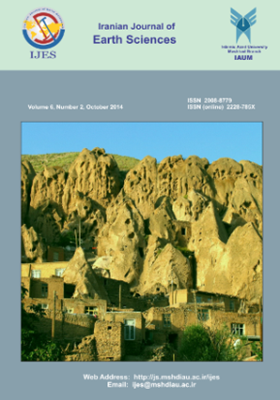Discrimination of Iron High Potential Zones at the Zaghia Iron Ore Deposit, Bafq, Using Index Overlay GIS Method
محورهای موضوعی : MineralogyBehnam Sadeghi 1 , Masoumeh Khalajmasoumi 2 , Peyman Afzal 3 , Parviz Moarefvand 4
1 - Department of Earth and Oceans, James Cook University, Townsville, Queensland 4811, Australia
2 - Department of Geology, Islamic Azad University, Science and Research Branch, Tehran, Iran
3 - Department of Mining Engineering, Faculty of Engineering, South Tehran Branch, Islamic Azad University, Tehran, Iran
4 - Department of Mining Engineering, Amirkabir University of Technology, Tehran, Iran
کلید واژه: index overlay, Zaghia, Fractal, Concentration-Area, iron mineralization,
چکیده مقاله :
GIS is considered an important technique as well as a prerequisite for cost effective mineral exploration and determination of high potential areas. The purpose of this research is to determine high potential iron zones for detailed exploration using index overlay GIS method. Index Overlay was used to combine the geology, topography (scale: 1:1,000), lineaments, remote sensing (ASTER and ETM+) and geochemical data. Appropriate weights were allocated to each layer based on the significance of each data layer. Concentration-area fractal method was applied to data acquired from trenches in order to isolate iron anomalies and add them to the geochemical layer. Evaluation of the information layers along with fractal analysis, differentiated three geochemical iron populations. By combining the information layers obtained from GIS, high potential zones were determined. Regions with codes 1, 2 and 3 are the most promising areas, respectively, and are proposed for more detailed exploration and drilling.
GIS is considered an important technique as well as a prerequisite for cost effective mineral exploration and determination of high potential areas. The purpose of this research is to determine high potential iron zones for detailed exploration using index overlay GIS method. Index Overlay was used to combine the geology, topography (scale: 1:1,000), lineaments, remote sensing (ASTER and ETM+) and geochemical data. Appropriate weights were allocated to each layer based on the significance of each data layer. Concentration-area fractal method was applied to data acquired from trenches in order to isolate iron anomalies and add them to the geochemical layer. Evaluation of the information layers along with fractal analysis, differentiated three geochemical iron populations. By combining the information layers obtained from GIS, high potential zones were determined. Regions with codes 1, 2 and 3 are the most promising areas, respectively, and are proposed for more detailed exploration and drilling.


